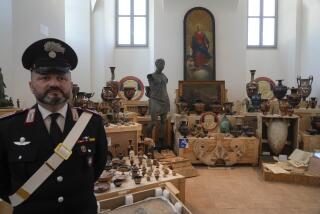Getty Official in Italy for Talks on Contested Art
On the day before the Getty Museum opens its lavishly renovated and antiquities-laden villa near Malibu, Director Michael Brand will be in Rome, meeting with Minister of Culture Rocco Buttiglione to discuss contested items in the Getty’s collection.
Brand, who took the reins of the museum less than a month ago, is leading a five-person team to the gathering, which a Getty spokesman calls “the onset of a dialogue.”
The Getty’s team includes museum employees and Getty and outside attorneys, spokesman Ron Hartwig said. Getty Trust President Barry Munitz, to whom Brand reports, remained in Los Angeles.
Brand and company are scheduled to return Saturday, the day the villa reopens its antiquities collection to the public. The villa’s galleries include 1,200 items, among them 30 pieces contested by Italy and four pieces contested by Greece. Hartwig noted that the team was prepared to stay beyond Friday if it saw a chance for significant progress.
The meeting comes amid a tense and busy week for the Getty. Apart from the reopening of the villa (where renovations cost $275 million) and Wednesday’s resignation of trustee Barbara Fleischman, the museum’s former antiquities curator is in the middle of a trial in Rome.
In that case, which has drawn international attention to the role of museums in the antiquities trade, Italian prosecutors accuse Marion True of conspiring to receive items looted from Italian soil. True resigned from the Getty in the fall amid revelations that she had accepted personal loans from business contacts without informing her superiors.
Brand’s overtures to Rome began in mid-December, about two weeks before the director’s first official workday, Jan. 2. The first move, Hartwig said, was a letter from Brand “to the [Italian] minister of culture, suggesting that he would like to get together with him to begin a discussion that would work cooperatively toward finding a solution that satisfies both sides.”
In a statement prepared before his departure for Rome, Brand said: “The Getty’s objective is to develop a fuller sense of all the evidence available regarding the objects in question. We want to be in a better position to continue our dialogue with the Italian government.”
Many pieces contested by the Italians were included in a 1996 donation and sale that brought more than 300 items from Fleischman and her late husband, Lawrence, to the Getty. Within weeks of agreeing to hand over their antiquities collection to the Getty, the Fleischmans extended a $400,000 loan to True.
Getty officials say neither Barbara Fleischman nor True disclosed the loan to other Getty officials at the time. Nor was it disclosed when Fleischman joined the institution’s board in 2000.
Getty officials acknowledge that many museum acquisitions have uncertain histories, but they say they never acquired any item they knew had been illegally exported.
Beyond the Getty, Italian prosecutors have said they believe half a dozen other U.S. institutions are holding looted artifacts, including New York’s Metropolitan Museum of Art, Boston’s Museum of Fine Art, the Minneapolis Institute of Arts, the Toledo Museum of Art and Princeton University Art Museum.
The Metropolitan Museum’s director, Philippe de Montebello, flew to Rome in November for a four-hour meeting with Italian Culture Ministry officials. By some accounts, it included exploration of a compromise in which Italy would claim ownership of contested items but then make at least some of them immediately available again via long-term loan agreements. But publicly Montebello has stuck with the museum’s long-standing position that it will relinquish items only when proof of illegal origin is presented.
Since 1939, Italian law has forbidden export of any antiquity without government permission. Under Greek law, any archeological item removed without government approval since 1830 is considered a looted item.
The Australian-born Brand, 47, earned a doctorate at Harvard, where he specialized in Indian art. He came to the Getty after five years at the helm of the much smaller Virginia Museum of Fine Arts in Richmond.
When his appointment was announced in August, Glenn Lowry, director of New York’s Museum of Modern Art, noted that “people often misread Michael because he is soft-spoken and quiet, when in fact he is a very forceful, highly focused and driven man.”
More to Read
The biggest entertainment stories
Get our big stories about Hollywood, film, television, music, arts, culture and more right in your inbox as soon as they publish.
You may occasionally receive promotional content from the Los Angeles Times.











